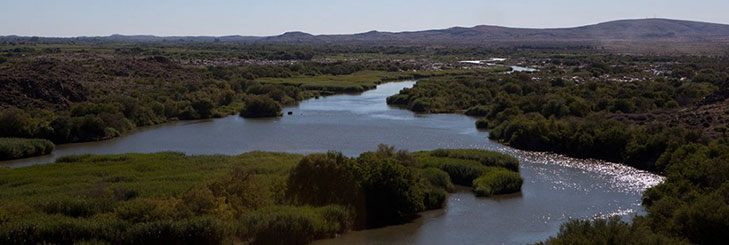Welcome to the first surface water quantity report of the Orange-Senqu River Commission (ORASECOM), for the hydrological year 2020-2021. For Read more
Categories
Latest Submission
2020-2021 Orange-Senqu Surface Water Quantity Synoptic Analysis
Khakea-Bray Transboundary Dolomite Aquifer Recharge Assessment
Documentation and Data: A read-only folder structure of all reports, data, and models related to the STAS can be accessed Read more
Improving Groundwater Knowledge in Selected Transboundary Aquifers
Documentation and Data: A read-only folder structure of all reports, data, and models related to this study can be accessed Read more
Stampriet Transboundary Aquifer System (STAS) – Governance of Groundwater Resources in Transboundary Aquifers (GGRETA) Project
Documentation: A read-only folder structure of all reports, data, and models related to the STAS can be accessed from here: Read more

Development of Integrated Orange-Senqu River Basin Model (WP1)
- Author:Bennie Haasbroek
- Post date:24 October, 2013
- Categories:Climate,Integrated Water Resources Management,Surface Water Resources,Water Use
Objectives
- to enlarge and improve the existing models to cover the total Orange River Basin and
- to capacitate representatives of each of the basin states to set up and use the models.
Main Activities
- Assessment of strengths and weaknesses of existing models
- Extension and expansion of the existing models
- Assessment of system yields
- Review the water balance for the Orange/Senqu Basin
- Developing a system schematic for the full system
- Assist representatives from each of the four Basin States to set up and use the models
Conclusions:
The existing “Yield” (WRYM) model was updated to include additional components in various
parts of the Orange/Senqu basin. The updated models also make use of the updated and
extended hydrology. Only the Fish River in Namibia has not been completed and will be
included at a later stage. The modelling work was complicated to some extent by the fact that DWA South Africa is currently upgrading the models and the Project Team had to work with the available versions. The current model developments by DWA South Africa is likely to continue for most of 2011 and will probably be followed my more upgrading phases. Any upgrades to the models will be made available to the 4 basin states as and when available. This also complicated the capacity building process in some respects and it is clear that follow up courses will be required as new software versions become available.
Recommendations:
A number of activity related conclusions and recommendations are provided in the various
working papers and reports. In addition to these, a number of important general recommendations can be made.
- Regular capacity building sessions at both the expert and decision-maker level should continue in Phase 3 and beyond. This will allow each basin state to keep abreast of new software developments, promote transparency and ensure that decision-makers from each basin state can contribute to basin-wide water resources management decisions on an equal footing
- The ORASECOM Secretariat should serve as custodian of the updated model setups, ensuring that updates carried out at the country level are properly consolidated.
- The ORASECOM Secretariat should play a leading role in facilitating the annual technical review process.
Source:
Support to Phase 2 of the ORASECOM Basin-wide Integrated Water Resources Management Plan
Funding Organisation(s):
Date:
2011
Documents
Data



Comments
You must be logged in to post a comment.